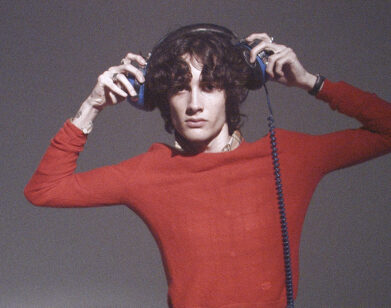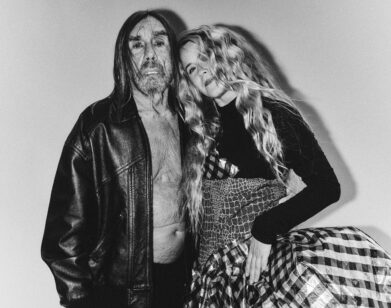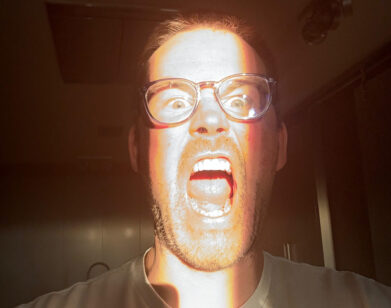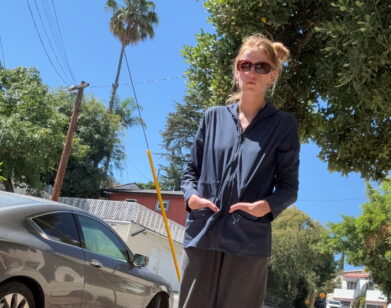Exclusive Album Stream: ‘Dreamers,’ Psychic Dancehall

PSYCHIC DANCEHALL. PHOTO COURTESY OF MARCO GONZALEZ
Psychic Dancehall is the collaboration of Charles Rowell and Hollie Cook. Rowell made a name for himself with the highly-regarded indie band Crocodiles, while Cook achieved critical success as a singer through collaborations with musicians such as Ian Brown and Jamie T. Descended from punk royalty as the daughter of Sex Pistol Paul Cook, Hollie was also a later member of the iconic all-woman post-punk band the Slits.
Two years ago, spending time indoors in a rainy San Diego, Rowell’s and Cook’s romantic relationship bloomed into a musical partnership. Initially taking the pseudonyms “Dorian Wartime” and “Sylvia Innocent,” it is only now that the duo has revealed themselves as the makers of this music. Interview talked to Charles Rowell about the new album, Dreamers, the role of aliases, and creative love. We’re also excited to premiere a stream of the new album, which you can find at the end of the interview. Listen to the second single, “White City,” below.
NICHOLAS MALTBY: You’ve just gotten back from Berlin. How was it?
CHARLES ROWELL: It was good, it was great. We got quite a lot done.
MALTBY: Were you touring as Psychic Dancehall there?
ROWELL: No, Crocodiles.

MALTBY: So you’re keeping Crocodiles going at the same time as Psychic Dancehall?
ROWELL: Yeah, it’s the main thing that I do, definitely. What Hollie and I did was something we just did ourselves when we were living together, and we didn’t really have real thoughts about releasing anything, you know. We kind of looked at it very sexually, and more as the idea of treating characters, and fabrication; as opposed to something like a touring vehicle.
MALTBY: Why have you and Hollie withheld your real identities from the project until now?
ROWELL: It was just the idea of fabricating something and creating something almost like a pen name. It wasn’t anything that we were looking to release, obviously we had a concept behind it and we thought it would be neat if it just had a mysterious look and aesthetic to it. It was just adding to the mystique of it. It was just—it would be interesting to wrap this project up in an album that had characters attached to it, and that possibly the listener could carry, or take away with them and sort of create their own ideas, as opposed to being two people that everybody is familiar with.
MALTBY: And so, how long did it take to compose the album?
ROWELL: It was over the course of Christmas up until the New Year of 2009–2010, when we were living together. We thought it would just be fun to write some songs because we were finally living together, and it was really bad weather—so we stayed in a lot. And we didn’t have a lot of tools; it was just tweaking and hearing. I feel like the creative part about it was just what we were inspired by each day: we were living above a theater where a lot of strange plays were taking place; a lot strange people hanging around. There was a seedy drag bar that was near the house as well. I think at night we just ventured out and we got a lot of inspiration from all these places. The theater we were living above had a lot of really bizarre acts and shows, and that was inspiring—so we just started writing songs as we were living together and we covered a couple of old songs, and it was all just meant to have some sort of real romantic style of production, sort of Jean Genet-type literary style. It sort of just creates the aura that we were half living in, I suppose.
MALTBY: How much do you see the album as a series of separate vignettes? You talk about inspiration from local characters, for example, a transsexual you knew from a local lesbian bar, who contributed to one of the songs—how much is it an album of those people’s stories?
ROWELL: The people who we were hanging around with or were affiliating ourselves with, I think they filled in half of what we couldn’t bring ourselves—much in the same way as Lou Reed knows a lot about the grittier side of New York City, but I think that what he doesn’t know is what actually makes it charming and romantic—so we’re on the same lines. We’re confined to a neighborhood, and I think a pretty cool neighborhood, and I think there was just a unique opportunity to be inspired by it: like Lexus, who was the transsexual, came up with the melody for “White City.” I think the idea was sort of bringing their spirit to it, and not trying to drag it down into any sort of indie band.
MALTBY: So give me a track that you thought had an essential contribution from someone in town, and describe that kind of process?
ROWELL: Like I said, “White City” was just a fun night where we all ended back at our place and something was created. “A Love That Kills” was inspired by this drag play that we saw, where a woman beats her lover to death with a dildo, and “A Love That Kills” just sort of came from that.
MALTBY: Are you and Hollie living together at the moment?
ROWELL: Yes, in London.
MALTBY: What do you think of London—were you there doing the riots?
ROWELL: No, I wasn’t, but I was definitely worried about her, and all of her friends. That’s kind of what “White City” was about, aside from the melody coming from a good friend of ours. That was sort of written about how there’s so much beauty and violence in England—never more so than now, I believe.
MALTBY: Did your name come from the song by The Fall?
ROWELL: No, I think the name is just an accurate way of summing up the project or the album, you know, and just like the fact that we came up with names and it was just takes the listener to some place. It creates something bigger than some two people.
MALTBY: I don’t see it as traditional dancehall, but it is actually quite dancey. Talking about names—Dorian Wartime and Sylvia Innocent—is that connected to Dorian Gray and Sylvia Plath?
ROWELL: [laughs] Yeah, I definitely think that those—I mean, they weren’t labored over—those names, amongst many others, would spring to mind when people were trying to understand it. I think that’s a plus. The names bring a strange air with them.
MALTBY: Do you think there is an aggressive element in your melodies—I’m thinking specifically about the name, “Wartime”?
ROWELL: I’d be flattered if sex and violence were brought up in anyone’s review of what they felt after listening to the record. I think they’re both very powerful. The idea behind the artwork and the aesthetic was sort of melding sex and violence together. I think that the music has quite a brash aesthetic to it, because of how we recorded it, so it has this very raw feel. The idea of spreading interesting words and titles out there makes it interesting for the listener.
MALTBY: Do you see important precedents for couples producing music together? Obviously there is Serge Gainsbourg and Jane Birkin; although there is not much similarity in terms of the actual music there. But it’s actually quite rare to have couples creating together—usually you’ll have two creative people each producing their own stuff.
ROWELL: I do, I do. I definitely think that everything about it boils down to it being her and I together. It came across as quite aggressive, in the best way possible, and that’s the way that Chris & Cosey make their sort of music. They’re a fantastic duo. And I think Serge and his love interests also made music with a bit of sex and a bit of violence in it. And I think that’s great, you know. It jumps out at you, it pops a little bit more when there’s that sort of energy.
MALTBY: What are yours and Hollie’s different qualities on the album as a whole? For example with your lyrics, you have a distinctive style: your voice seems to lack clarity, so the listener needs to absorb the record to pick up the lyrics.
ROWELL: I think it was intentional that a lot of it would be misheard. Like I said, what the listener doesn’t know is an asset to the artist: they’ll fill in the blanks. And it all has a literary undertone to it—they’re all poems, and they’re all inspired by great writers. It wasn’t appealing for us to put it all out there, obviously: we were hiding a lot of it away on purpose. The same goes with the lyrics, and how clear they were, and how the voices were. As for the qualities that both of us bring, I mean, it was 50-50; Hollie has amazing ideas, I think a lot of the melodies came from her.
MALTBY: Where would you like Psychic Dancehall to be in a few years’ time?
ROWELL: Only time will tell. I don’t know. It wasn’t created to be a band, it was just created to be a union. The idea of touring, or turning this into some kind of cash cow, is totally out of the question. I think we’ll definitely do gigging together. The idea of behind it was for it to be very mysterious, and I think it should stay that way. There is a lot that is left to be desired, but it’s also quite beautiful and strange at the same time.
DREAMERS IS OUT TODAY. LISTEN TO A FULL STREAM OF THE ALBUM BELOW. FOR MORE ON PSYCHIC DANCEHALL, VISIT ART FAG RECORDINGS’ WEBSITE.






